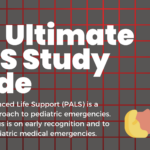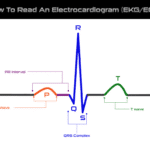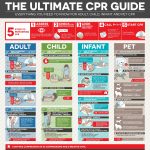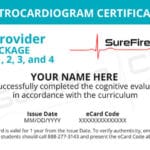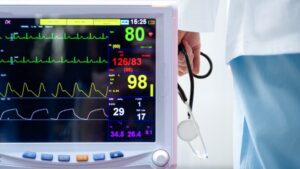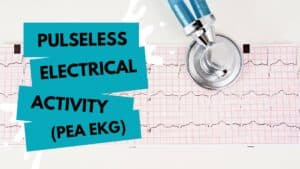You put in the hard work to get ACLS certified. Don’t let it go to waste! Make sure to retain the valuable ACLS course important knowledge you’ve gained during class.
The Importance of ACLS Training
If you’re a medical professional who may respond to cardiovascular emergencies, you need Advanced Cardiac Life Support (ACLS) certification. In an ACLS training course, you’ll learn a variety of emergency cardiac response techniques including:
- EKG Interpretation
- Cardiac arrest response
- Airway management
- ACLS pharmacology
- Basic Life Support (BLS) Management of acute coronary syndromes and stroke
- Resuscitation teamwork
These essential skills will help you save a life in the event of a cardiac emergency.
3 Things Not To Forget From Your ACLS Courses
Learning ACLS doesn’t stop once you’ve gotten your certificate. In order to be the best healthcare provider you can be, you’ll need to stay on top of these ACLS key subjects to remember.
However, as medical personnel, we are constantly overloaded with new information. It can be difficult to balance ACLS course knowledge to remember with everything else you’ve learned. To help you navigate your studies, we’ve collected a list of 3 ACLS course important learnings.
The ACLS algorithms and EKGs are some of the most important things you’ll learn in an ACLS training course. Getting these algorithms down will help you know the proper steps to care for a patient experiencing a cardiac emergency.
Examples include Acute Coronary Syndrome Algorithm, Adult Cardiac Arrest Algorithm, and the Intermediate Post-Cardiac Arrest Care Algorithm.
EKG rhythm interpretation is also critical. If you can’t read the rhythm, you can’t treat the patient. EKG rhythms can be intimidating so we created a free online EKG intro course to help keep your skills sharp and your stress levels low.
You’ll also want to remember the potential causes behind your patient’s arrhythmias, sometimes referred to as the “Hs and Ts”.
The “Hs” include: Hypovolemia, Hypoxia, Hydrogen ion excess, Hyperkalemia, Hypokalemia, and Hypothermia.
The “Ts” include: Toxins, Tamponade, Tension pneumothorax, and Thrombosis.
Another important topic is medications and dosages associated with ACLS algorithms. Knowing which drugs are considered “primary ACLS drugs” will help you be ready to administer emergency treatment. Note that as research develops, the AHA will change its guidelines. As such, it’s a good idea to look up the most recent list and see if any medications have been added or removed since you got certified.
You’ll need to be able to recall a few different medications such as adenosine, epinephrine, and lidocaine.
Remembering Essential ACLS Skills
Now that you know the things to not forget from the ACLS course, you can create a plan to study them. Committing ACLS knowledge to memory can be difficult, but there are plenty of ways to review the material.
One of the best ways to memorize something is by talking about it with others. If you know someone from your ACLS course or have another friend in the medical industry, you can work with them to review the material together. Try talking through some of the key topics and asking each other questions to jog your memory.
Another tip is to look for online resources related to ACLS topics. From reading AHA articles on the latest ACLS updates to using online study materials, there are plenty of ways to review ACLS content.
Last but not least, you can use SureFire CPR’s ACLS resources available on our blog. We have a variety of posts relating to ACLS topics. Reading a few blog posts a week is a great way to keep the information fresh in your mind.
Mastering Critical ACLS Techniques
Looking for more tips to help you retain ACLS course important knowledge? Try these study ideas:
- Take a practice exam
- Create a study guide
- Make flash cards
- Use online quizzes
- Create a study group
- Read our guide: How To Pass ACLS Certification Exam Like A Boss
When it comes to mastering emergency response techniques, practice and review is key. Even just a few minutes of practice a day can help you stay sharp.
Additional Tips to Improve ACLS Knowledge Retention
It’s also important to remember that successful studying starts with your own health. Make sure you’re getting sleep, eating well, and staying hydrated. Taking care of yourself will help you take better care of others.
Get ACLS Certified at SureFire CPR
Need to get ACLS certified or renew your certification? Take SureFire CPR’s course. Our program follows American Heart Association guidelines for a comprehensive, high-quality education. Plus, our team of experienced professionals makes learning fun and engaging. Sign up today.
FAQ’s
Even if you use ACLS techniques in your job every day, it’s still important to study and review the principles. You should regularly review your course notes, read articles online, or have a review session with a friend or coworker.
While everything you learn in an ACLS training course is important to know, there are a few topics that are essential such as algorithms, cardiac arrest response techniques, and ACLS pharmacology.
There are a few areas that students commonly forget during ACLS training, such as ACLS algorithms. To avoid making any mistakes, it’s a good idea to study ACLS topics often and take a renewal course when your ACLS certification is about to expire.
To retain the skills you’ve learned in an ACLS certification course, you should study and review the content regularly. There are many different ways to practice, from taking sample ACLS exams to creating flashcards. Find the study method that works best for you.
To remember the key points from an ACLS course, you can use ACLS mnemonics such as “Hs and Ts”, review algorithm diagrams, and study online training materials. The best way to commit the information to memory is to review it often, so aim to make studying part of your weekly routine.


